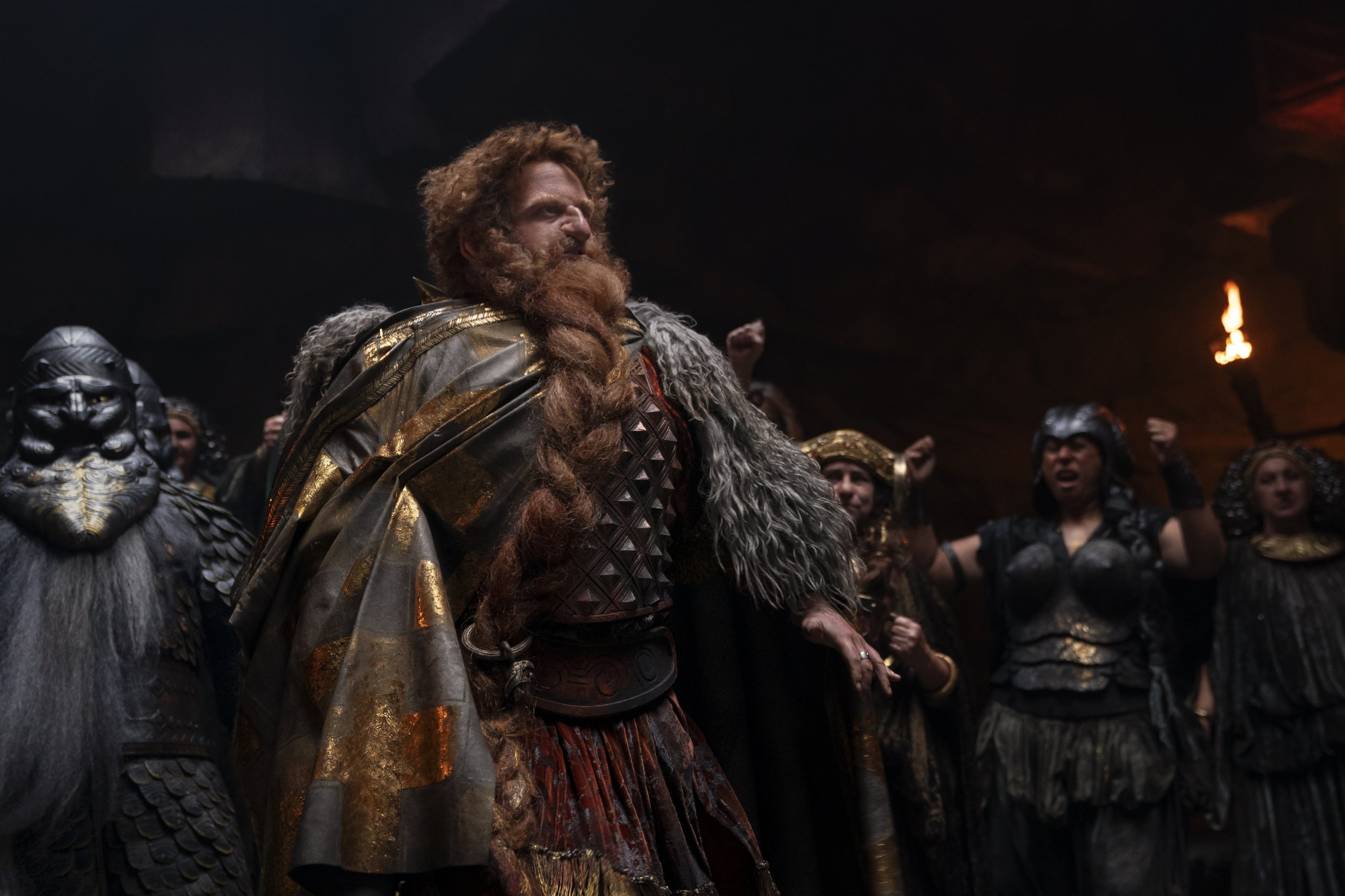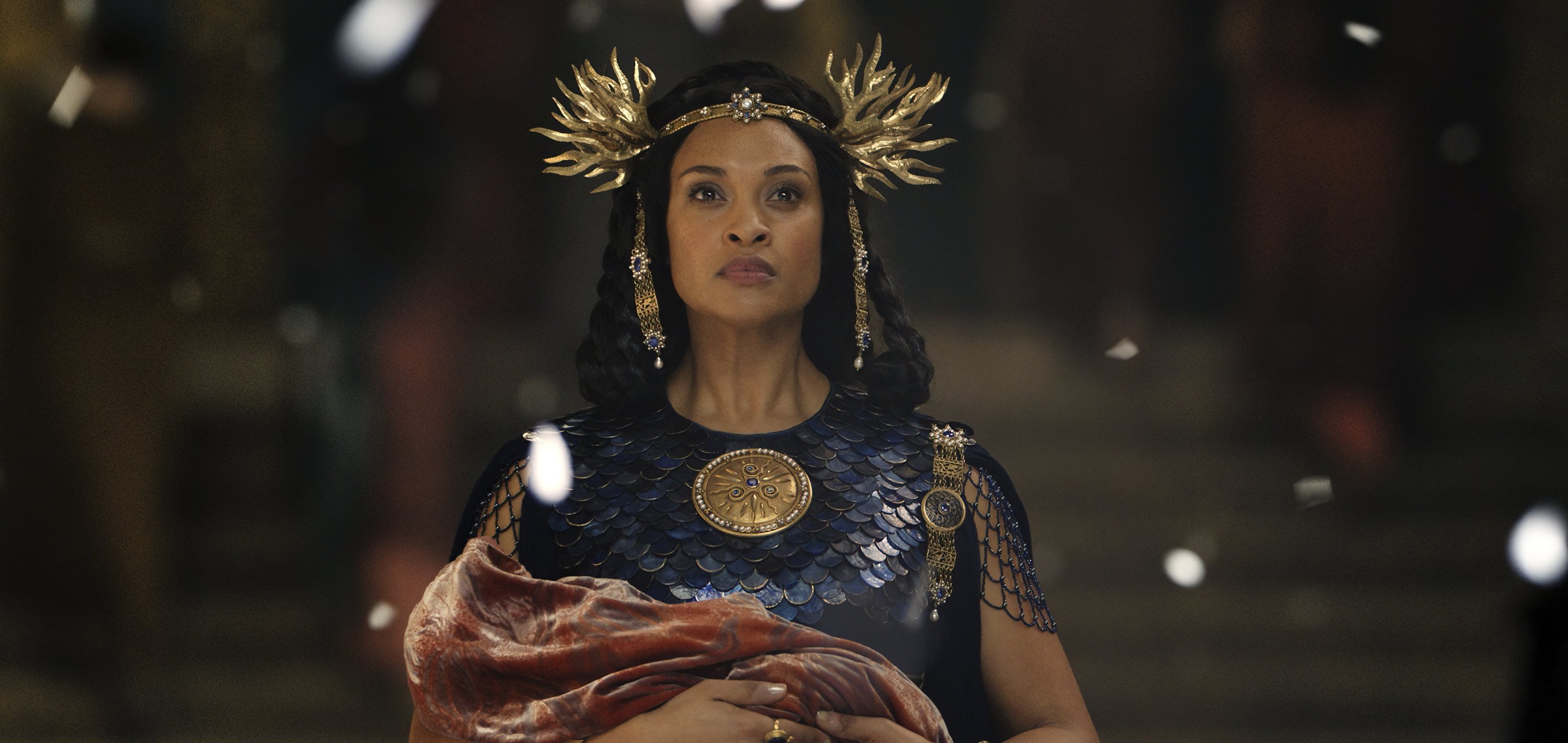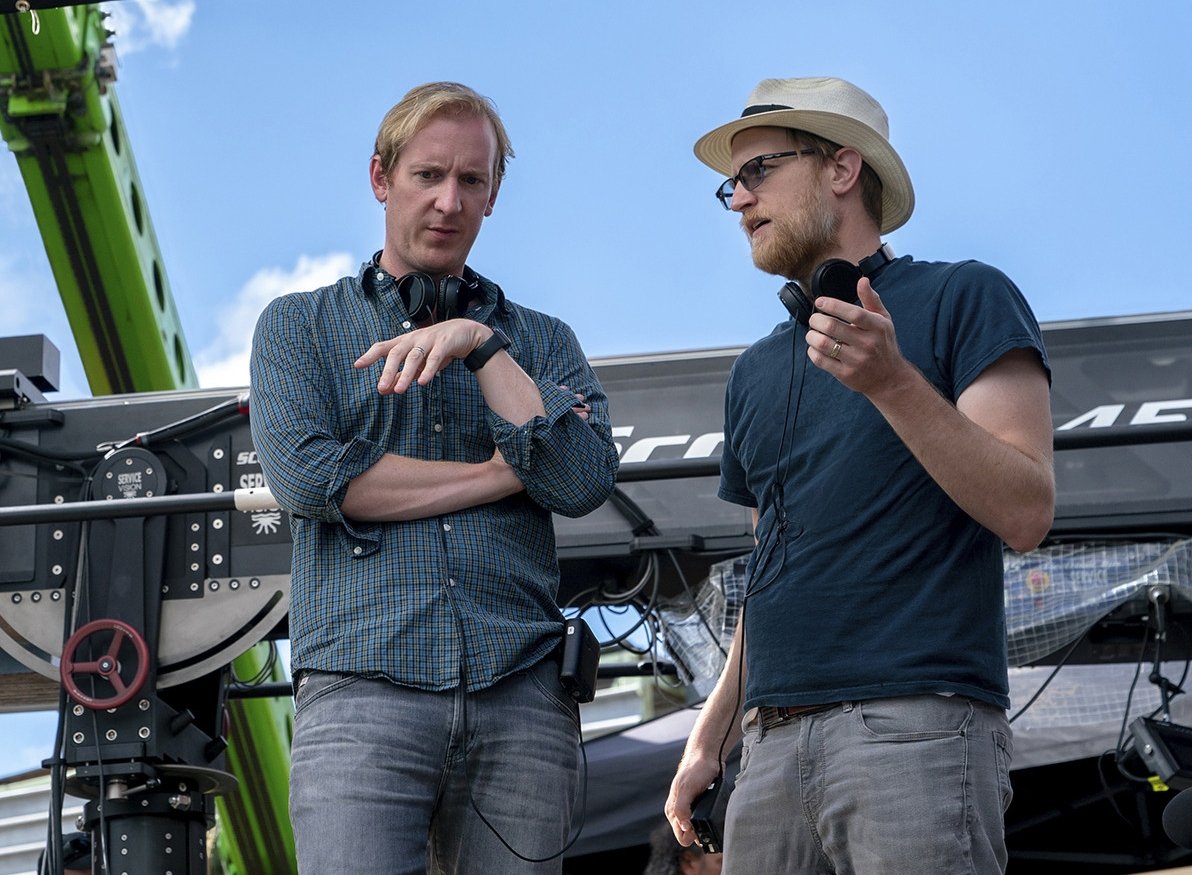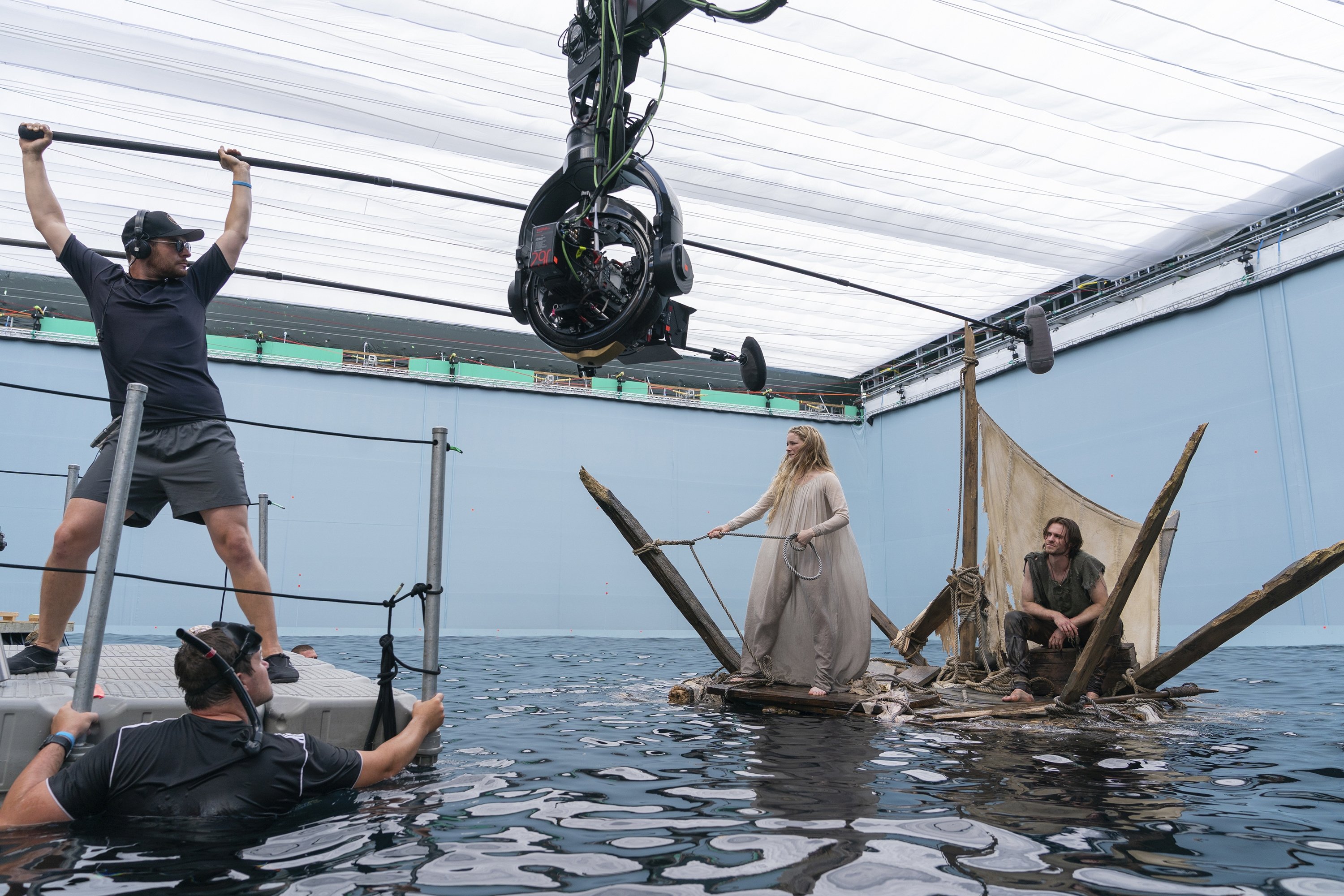© Turkuvaz Haberleşme ve Yayıncılık 2024
And Faramir said: "Do not scorn pity that is the gift of a gentle heart, Eowyn!" Then the heart of Eowyn changed, and she said: "I will be a shieldmaiden no longer, nor vie with the great Riders, nor take joy only in the songs of slaying. I will be a healer and love all things that grow and are not barren." Like Eowyn from that passage in "The Return of the King," I have had a change of heart, too. I will no longer take joy in the songs of slaying a work of art. Let's get to "The Lord of the Rings: The Rings of Power," then, shall we?
If one lets trolls determine their path in Middle-Earth, one deserves to get turned into stone by sunrise. Unfortunately, "The Rings of Power" – Amazon's new series set in J.R.R. Tolkien's expansive, grand and epic world – with only three episodes released as of yet, has been bombarded by bad-faith reviews. Some deeply hurt and justified book fans, casual fans who have been led astray and just plain and simple trolls of the internet, all of which together surely may turn people off from even giving a chance and tuning in to an extravagant and monumental piece of television that is trying its best to become an epic cinematic experience on small screen, a rarity to behold.
How did we get here? Well, if we take a retrospective down the past half a decade, Amazon is squarely to blame for the fiasco of public resentment that has been undeservedly laid on the feet of this show which honestly with its three episodes released so far shows clearly that it warrants not even half of the unbelievable mountains of criticism it has received.
I will not be reviewing the show itself yet, as I believe one should reserve judgment at the very least till the end of the season when one can take a more informed look at what the showrunners are attempting to create and what their bigger picture may be with their story given more time to breathe and their characters allowed to grow and flesh out. With its three episodes as of now, "The Rings of Power" has some points of greatness about it, some interesting and intriguing choices, some confusing picks and some aspects that are just not good.
All in all, I believe it premature to judge it yet for these reasons, as the show progresses to the finale of the season those confusions can be cleared up, those unwelcome aspects can be justified, or it can stumble and fall and its greatness can turn into a terrible abomination, leaving a very unpleasant aftertaste. Simply put, the show has the promise of a great potential, and I shall judge it on whether it realizes that potential and how well it manages to execute its route to that height.
So, no this is not a review of the show – at its current unfinished state – but rather a look at how Amazon dropped the ball so hard that the most expensive television series of all time based on the most beloved work of fantasy of all time has become the subject of such fierce debate and prejudicial contempt.

Back in 2017, Amazon paid the author Tolkien's estate a mere $250 million just for the rights to be able to create a story in Middle-Earth. Then began speculation time, especially after it was heard that Amazon had vowed in its contract to produce at least five seasons of whatever it was going to create.
Fans were curious and cautious of what Amazon might create in Middle-Earth. The company had just paid a quarter of a billion dollars only for the rights, and "The Lord of the Rings" encompassed not only a story told over the three volumes but thousands and thousands of years of Middle-Earth history from which one could conjure an epic tale for the television. Before even a single camera rolled on set, the series was going to be the most expensive in the history of home cinemas, with every season set to have a budget of $250 million and the series overpassing $1 billion by its fifth season.
Months turned into years as droplets of information trickled down the various leaks and announcements quite slowly. First, the showrunners were confirmed, Patrick McKay and John D. Payne. The duo was entirely unknown quantities, having only worked on "Star Trek: Beyond" previously and even then uncredited. This surely raised some alarm bells throughout the fandom. How could Amazon trust its billion-dollar series to two unknowns with no pedigree in the intensely competitive cinema industry?
Then it began, though painfully slowly it began. At the start of the second decade of the second millennium, we started to hear more and more about what the series was going to focus on. After endless speculation over its subject matter – was it going to be a remake of "The Lord of the Rings," was it going to be set after "The Lord of the Rings," was it going to be set before the original trilogy, what about the First Age of Middle-Earth, or the Second Age of Middle-Earth, was it going to be an anthology series with each season telling a different story – it was finally confirmed that the series would take place in the Second Age of Middle-Earth, thousands of years prior to the time of "The Lord of the Rings," and then it was revealed that it would center on the forging of the Rings of Power and the rise of the Dark Lord Sauron – the main villain of "The Lord of the Rings."
Everyone almost agreed in unanimity that this was a good choice, it was a solid time to set the story with rich characters, themes and clashes. The fans at this point – myself included – probably forgot or ignored the fact that Amazon did not have the rights to "The Silmarillion" or the "Unfinished Tales," two of Tolkien's posthumously released books – gathered and edited together passionately and diligently by his son Christopher Tolkien from his father's notes in an unprecedented effort to complete his father's epic and mythical saga – two books that contained most of the stories of the First Age and detailing most of the Second Age material. The series would be based almost entirely on the Appendices of "The Lord of the Rings," so, the showrunners were in a bit of a pickle but we will get to that later.

The downfall of "The Rings of Power" – its downfall in the sense of its chastisement even before its first episode aired, rather than its low or high quality as a piece of television on itself – has been twofold in my eyes.
The first and foremost of that puzzle has been the unattractive marketing.
What was Amazon thinking? I have no idea, and I dare not imagine. The showrunners went on numerous interviews about the series, the executives released several statements to the media, we had a series of promotional materials, all trying to hype the show, and it should have been easy to market this piece of television, but every word that came out of anyone related to the show and every pixel of image released only added to the fire of fans who were already on edge and worried. How?
Quite simple: Amazon harnessed the wrong horse. They put diversity and originality at the forefront. I am not saying the show should not have been diverse. That's what the racists said. What I am saying is that diversity and originality should not have been the center of the show's marketing strategy. This focus, as far as I can tell, led to two unfortunate outcomes: The racists and bigots were up in arms on the diversity part – because no one sensible would criticize a character without even having heard a piece of their dialogue or seen their story, having only the color of their skin as the basis of criticism – and the fans were truly concerned on the originality part because as it stood nearly most of the characters were original characters created for the series without having a basis in books.
The first trailer did nothing to quell the concerns of either party. Well, nothing you do can quell racists, so that is a lost cause anyway, but Amazon truly did not handle the fans well. They doubled down on their stance and as they did, they lumped the racists and the concerned fans into the same basket, a legitimate mistake I believe a lot of studios make. So, they went even further to push their originality and justify it. This meant even more fans had started to worry.
It may have started with a few snowballs of concern over new characters being introduced to the lore but soon as more and more information about the show began to be revealed it became an avalanche of hatred among the book fans as originality meant established characters appearing in times and places they should not have or being characterized in contradiction to Tolkien's writings, plot points moving around ages, entire Middle-Earth races appearing out of thin air – looking at you Hobbits, I mean Harfoots – and that avalanche, once it gets rolling, is nigh on impossible to stop. However, I will touch on that avalanche more in the second half. So, let's get back to marketing.
The showrunners may have been forced to come up with new characters and storylines to create a cohesive plot and an arc based on a set of themes. However, the marketing should never have made that originality and deviation from the source material the center point of its strategy. They needed to calm the fans down, they needed to reassure the fans that they respected Tolkien's life's work, they needed to show that they understood this precious work of art that has become almost like a religion to some of these fans. Instead, what they did felt like a slap in the face for those fans.
Respect was the keyword that proved the downfall of the marketing of "The Rings of Power" in my view. Amazon did not provide the respect that the fans deserved, and that was their biggest miscalculation.
It was not because the showrunners or the cast lacked that respect, I don't think. Very near the launch of the series, there were a few interviews, or behind-closed-doors meetings between the showrunners and some select fans, and you could tell from the fans' reactions that the showrunners respected Tolkien and his source material. However, Amazon did nothing to help the creators relay that feeling of respect to the fans. At every step, they somehow managed to choose a set of decisions that would maximize the hatred of the fans, that would make them seem the most out of touch with the fans they could seem. I don't understand how they have successfully been so miserably off the mark at every turn.
They had so many opportunities to reach out with a friendlier hand to fans. They could have made the showrunners more available for interviews, they could have released more statements to ensure that they intended to respect Tolkien's world, they could have released trailers that focused more on elements of the show that relied heavily on established source material instead of original aspects, they could have even brought Peter Jackson back in a minor role – as he was heavily rumored to be in the early days of the series – to gain a little trust, or even better as they had already announced that the Tolkien Estate was going to be overseeing the series from a consultant role they could have provided a seal of approval from the Estate to soothe the fears of the fans. The most practical answer: They could have released the entire prologue of the first episode instead of one of the trailers which I believe would have been a huge boost as the prologue has been one of the best parts of the series so far and it is a great and relatively accurate piece from Tolkien's mythology.
In short, Amazon have no one but themselves to blame for this fiasco.

So, let's come to the other side of the coin of the downfall of "The Rings of Power," the immeasurably more subjective side of the affair: adaptations.
McKay and Payne were in a pickle as I said earlier. They had put themselves between a rock and a hard place by staging the series in the Second Age – the rock being the hardcore fans and the hard place being the amount of written materials they had access to or lack thereof – and at this point, I feel one is obliged to touch upon the nature of adaptations.
What the showrunners had at their hands was a lose-lose situation. The appendices, although great to read, are mere notes on the history of Middle-Earth's ages. They work in a written format for readers to enjoy as more information to delve into the backstory of this world. However, they could I strongly believe, in no shape or form, work in the visual medium without the writers having to do quite a bit of heavy lifting. So, the lose-lose situation: Stick to the source material which is quite possibly unfilmable – not in the sense that it is literally impossible to visualize but that it would not be appealing to anyone other than hardcore fans – or change certain elements, add and remove certain elements, move things around and basically adapt it into a cohesive and enjoyable piece of television.
This is ever the problem and the point of discussion with adaptations, and for sure the most subjective aspect of them: How much alteration is justifiable when adapting a piece of art into a different medium?
My personal threshold on the number of changes I am willing to forgive or ignore is very high, but most fans' are not that easily accepting of changes to their beloved artworks, and it is understandable. In this instance, "The Lord of the Rings" probably holds a biblical place in most fans' hearts, some have grown up with these writings, some have found themselves in them, some have lived through them, some have entire aspects of their personality influenced by Tolkien's words, some have found hope, some love, some purpose, peace, integrity and so much more among these pages.
Now, you are going to tell them: "Actually, that character which you so adore, is not really like that in reality. Look, their true personality should be like this." It is only understandable to have strong reactions to such changes.
However, on the other side of the conundrum, fans are also quite quick to ignore just how hard it is to create stories. If given the chance I believe, no fan could create a cohesive story from the scattered, some half-completed, most unfinished notes of a legendary author who is regarded as the founding father of modern fantasy literature, notes that span thousands of years and include innumerable characters and have that story be woven together in a united fashion with organic characters, plots that are understandable by general audiences, themes that touch viewers' emotions, and overarching storylines that connect episode to episode and season to season, and on top of all of that have that story be created in such a manner that it is accepted and welcomed by the fandom in general.
Such a utopian ideal of adaptation has never been accomplished by anyone I believe. It was certainly impossible for this adaption, especially considering the amount of time it needed to cover to have a satisfying overarching story, especially considering that it could not incorporate most details from the First Age – details that laid the backstories of so many elements and characters in the Second Age – as they simply didn't have the rights to, especially considering that what they based their story on is not a finished article but an appendix.
So, there must be a middle ground to these extremes. I believe that middle ground lies at the end of the season, and that is why I have decided against writing a review of the series so far. At the end of the season, having had enough time to breathe, I believe the series could show the pedigree of its story, the complexity of its characters and the dynamism of its plot. At the end of the season, as fans have a look at the bigger picture of where the series is headed, they can judge in a more informed manner if the changes are justified, if the alterations add or detract from the tale and the characters.
Simply put, I feel we just need to calm down.

So, rounding up this piece I have one last point.
On social media, you can see the reactions that fans had when "The Lord of the Rings: The Fellowship of the Ring" was first released back in 2001. Now, Twitter and Facebook and the like weren't around back then but there were forums and "The Lord of the Rings" fan community has been one of the most active communities on the internet since its early days. Peter Jackson was lambasted for his adaptation of the beloved books. He was crucified for having gutted a masterpiece. Fans were up in arms with fingers on keyboards. At least a minority were, and even then the minority that hates something was usually the most vocal part of the community.
So, what happened?
After more than two decades, "The Lord of the Rings" trilogy is regarded as a masterpiece of art. Its excellence in filmmaking from its mesmerizing production to dazzling sets, from its breathtaking effects to its gorgeous music, from its story to its writing, characters, plot, ensemble, directing, all of its brilliance of art is revered almost universally as one of the best trilogy of films ever made, holding up beautifully even over 20 years since its release.
What happened to the haters?
They have disappeared into the depths of the virtual world, only remaining on the internet's dusty history to be given as proof of shortsightedness of rash outrage in arguments.
I am certainly not saying that this series could hold a candle to the masterpiece of "The Lord of the Rings" – it was an exception in cinema and an exceptional piece of cinema that I doubt will ever be replicated – but I am saying it could prove itself to be something special.
The potential is there for this series to be one of the greatest pieces of fantasy television ever produced. The execution and realization of it hangs in the balance.
In nearly a month's time, we will have our answer as this introductory season to Amazon's Middle-Earth will come to a close and we will be able to look back at this, prologue if you will, in its entirety and judge it as a whole and weigh its promises for the following seasons.
